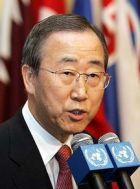UN chief fails to win Sudan over on Darfur troops
Jan 29, 2007 (ADDIS ABABA) — U.N. Secretary-General Ban Ki-moon failed on Monday to secure commitments from Sudan to allow the deployment of U.N peacekeepers in Darfur, despite lengthy talks at an African summit.

After the talks on Monday, Sudanese presidential adviser Majzoub al-Khalifa said there was consensus on the first two stages of U.N. support for a 7,500-strong African Union mission in Darfur, but there was no agreement to deploy a hybrid force.
“We are in full agreement on the first and second stages. We began discussions on the third stage,” Khalifa told Reuters after 1-1/2 hours of talks which made Bashir late for a meeting of African leaders to decide the chair of the pan-African body.
The violence in Darfur generated strong opposition to Sudan taking over the AU chairmanship in Addis, as promised a year ago. Sudan said it eventually withdrew to avoid dividing the continent.
Khalifa said: “We have agreed on a hybrid operation not a hybrid force.” Sudan opposes the deployment of thousands of U.N. peacekeepers in Darfur, but has agreed to allow up to 1,000 U.N. support personnel to bolster the struggling AU mission.
The U.N. envoy for Darfur, Jan Eliasson, told Reuters substantial numbers of troops were needed to halt the bloodshed, in which experts estimate 200,000 people have been killed and 2.5 million forced from their homes.
GAP REMAINS
A gap remains between the Sudanese and U.N. positions on the U.N. role in peacekeeping in Darfur. Sudan says it should be limited to increased support and rejects any U.N. combat troops on the ground.
The United Nations wants a joint U.N.-AU force.
“We need a sizable presence,” Eliasson said after the meeting with Bashir. “Even if we get…a (peace) agreement and effective ceasefire we need monitoring and with this size of country we’ll need a sizeable number.”
He said he would try to revive the peace process by going to Sudan in early February with AU mediator Salim Ahmed Salim to meet Darfur rebels who reject a peace deal reached in May 2006.
Since the agreement, Darfur’s rebels have splintered into more than a dozen factions.
“This is…a problem and I would hope that we would see greater cooperation between the non-signatories,” Eliasson said. “They have much to gain from that….because we aim in the end to have talks with the government.”
Rebels who reject last year’s accord say they want to start talks from scratch. Khartoum refuses to change the deal, signed by only one of three negotiating rebel factions.
“I have also heard from the government that they will take into account the legitimate grievances expressed (by the rebels),” Eliasson said.
Mostly non-Arab rebels took up arms in early 2003 accusing Khartoum of marginalizing the remote region. The International Criminal Court is investigating alleged war crimes in the region.
(Reuters)
